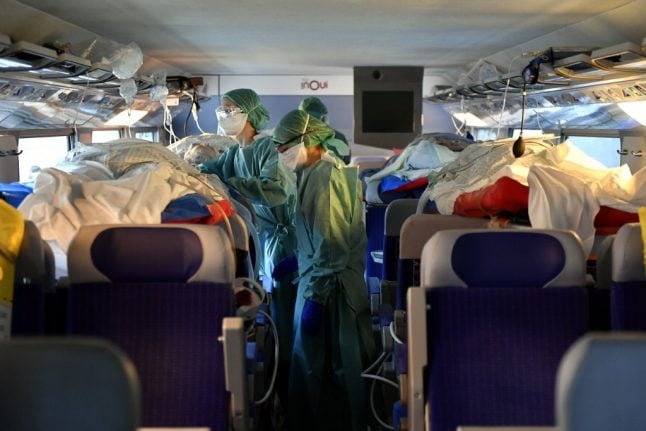The two specially modified TGV high-speed trains carried 36 patients from Mulhouse and Nancy toward hospitals along France's western coast, in an effort to free up intensive care units as officials brace for even more serious cases in the coming days.
Dozens of hospital workers, flanked by police and soldiers standing guard, spent hours installing four patients in each wagon in an operation that began before dawn.
In Maps: How the coronavirus epidemic has hit different parts of France
“We have to free up beds, it's absolutely crucial that we air out these intensive care units. We're still seeing an increase in patient numbers,” said Francois Brun, head of emergency services at the regional hospital in nearby Metz.
The evacuations came as Germany sent a military plane for the first time to Strasbourg to bring two patients to a hospital in Ulm.
 AFP
AFP
In total around 80 French patients have been hospitalised in Germany, Switzerland and Luxembourg, European Affairs Minister Amelie de Montchalin told France Inter radio.
She also thanked Berlin for sending France potentially life-saving ventilators “as recently as yesterday”.
France has been evacuating dozens over the past week from the east, hoping to stay ahead of a crisis that Prime Minister Edouard Philippe warned would only worsen over the next two weeks.
Overall nearly 4,300 coronavirus patients are in intensive care, many with severe respiratory problems requiring ventilators that officials worry could soon be in short supply.
Philippe said the government was racing to have 14,000 intensive care beds available soon, compared with around 5,000 before the outbreak began in January.
 AFP
AFP
'Battle is only starting'
France has mobilised its military to help hospitals, with the army using a helicopter to transport two patients to Metz and Essen in western Germany on Saturday.
“This war will probably be won on the basis of intensive care beds, and our ability to strategically use all our intensive care resources on the national level,” said Marie-Odile Saillard, director of the Metz regional hospital.
There are now 37,575 confirmed cases of coronavirus infection in France, up 4,611 on the day before, the government said Sunday.
The death toll stands at 2,314, but the numbers do not include deaths reported by the roughly 7,000 retirement homes and assisted-living facilities across the country, where officials fear the virus risks spreading quickly.
Those figures will start to be reported this week, the prime minister said Sunday, warning that “the battle is only starting.”
The government has ordered one billion face masks, mainly from China, but warned that worldwide demand for protective equipment meant they might not arrive soon enough for medical workers facing shortages.
France has been on lockdown since March 17 in a bid to limit the outbreak, a situation it now expects to last until at least April 15.



 Please whitelist us to continue reading.
Please whitelist us to continue reading.
Member comments